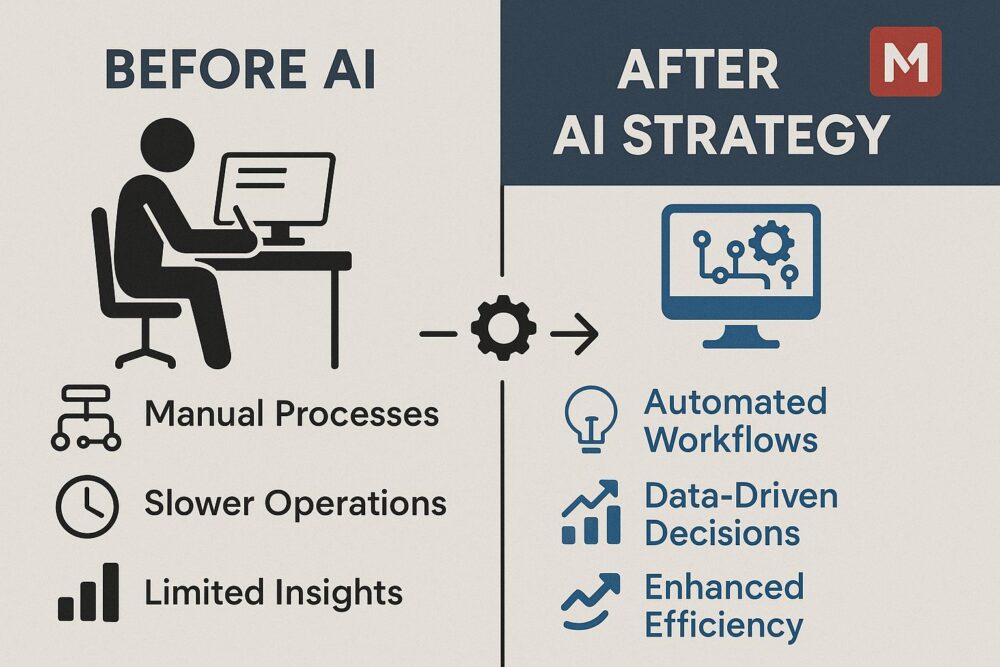The rapidly evolving artificial intelligence landscape demands sophisticated corporate AI strategy development that goes beyond simple technology adoption to encompass fundamental business transformation. Organisations that approach AI strategically, with comprehensive planning and expert guidance, consistently outperform competitors while building sustainable competitive advantages.
Modern corporate AI strategy requires understanding that artificial intelligence is not merely a technology upgrade but a catalyst for reimagining business processes, customer experiences, and operational efficiency. Companies that recognise this fundamental shift position themselves for exponential growth, while those treating AI as a peripheral tool often struggle with its implementation and results.
The complexity of successful AI integration demands specialised expertise that combines deep technical knowledge with strategic business acumen. This is when partnering with experienced consulting firms becomes essential for organisations seeking to maximise their AI investments while minimising implementation risks and timeline delays.
Foundation Elements of Effective Corporate AI Strategy

Strategic Vision and Objective Setting
Effective ai strategy: Successful corporate AI strategy begins with clear vision articulation that aligns artificial intelligence initiatives with core business objectives and long-term growth plans. This strategic alignment ensures AI investments generate measurable business value rather than serving as expensive technology experiments.
Leadership alignment across all organisational levels becomes crucial for AI strategy success, as implementation often requires significant cultural changes, process modifications, and resource allocation decisions that impact every department and stakeholder group.
Market positioning considerations help determine which AI applications provide the greatest competitive advantages within specific industry contexts. Understanding competitive landscapes and customer expectations enables strategic AI investments that differentiate organisations while creating sustainable market advantages.
Risk assessment and mitigation planning address potential challenges, including data privacy concerns, regulatory compliance requirements, and ethical considerations that could impact AI implementation success or create legal and reputational risks.
Data Infrastructure and Governance
Corporate AI strategy effectiveness depends heavily on data quality, accessibility, and governance frameworks that enable AI systems to function optimally while maintaining security and compliance standards. Organisations must assess current data capabilities and identify necessary improvements before AI implementation.
Data integration strategies that connect disparate systems and sources create comprehensive datasets that power sophisticated AI applications. Many organisations discover that data preparation represents 60-80% of AI implementation effort and timeline requirements.
Privacy and security frameworks ensure AI systems handle sensitive information appropriately while meeting regulatory requirements across different jurisdictions and industries. These frameworks become particularly important for organisations operating in regulated sectors, like healthcare, finance, or government.
Governance structures establish clear ownership, accountability, and decision-making processes for AI initiatives while ensuring ethical AI deployment that aligns with organisational values and stakeholders’ expectations.
Industry-Specific AI Strategy Applications
Financial Services Transformation
Financial institutions implementing comprehensive corporate AI strategies often achieve dramatic improvements in fraud detection, risk assessment, and customer experience while reducing operational costs and regulatory compliance burdens.
Algorithmic trading and investment management applications leverage AI to analyse market patterns, identify opportunities, and execute trades with precision impossible through traditional methods. These applications often generate substantial competitive advantages and revenue improvements.
Customer service automation through AI-powered chatbots and virtual assistants enables 24/7 support while reducing staffing costs and improving response times. Advanced implementations can handle complex enquiries while seamlessly escalating to human agents when necessary.
Credit scoring and loan underwriting applications use machine learning to assess risk more accurately while expanding access to credit for previously underserved populations. These applications often improve both profitability and social impact.
Healthcare and Life Sciences
Healthcare organisations that develop corporate AI strategies focus on applications that improve patient outcomes while reducing costs and operational complexity. These implementations often require specialised expertise due to regulatory and ethical considerations.
Medical imaging and diagnostic applications enhance physician capabilities while improving diagnostic accuracy and reducing interpretation time. These AI tools often detect conditions earlier and more accurately than traditional methods.
Drug discovery and development acceleration through AI reduces research timelines and costs while improving success rates for new medication development. These applications represent significant competitive advantages for pharmaceutical companies.
Operational efficiency improvements through AI-powered scheduling, resource allocation, and supply chain optimisation reduce costs while improving patient satisfaction and staff productivity.
Manufacturing and Operations
Manufacturing organisations implementing corporate AI strategy achieve significant improvements in efficiency, quality control, and predictive maintenance while reducing waste and operational costs.
Predictive maintenance applications use AI to anticipate equipment failures before they occur, reducing downtime while extending equipment life and optimising maintenance scheduling and resource allocation.
Quality control automation through computer vision and machine learning identifies defects and anomalies faster and more accurately than traditional inspection methods while reducing labour costs and improving consistency.
Supply chain optimisation applications use AI to predict demand, optimise inventory levels, and coordinate logistics for improved efficiency and customer satisfaction while reducing carrying costs and waste.
Implementation Framework and Change Management
Phased Deployment Strategies
Effective corporate AI strategy requires carefully planned implementation phases that build capabilities progressively while demonstrating value and maintaining organisational momentum. This approach reduces risk while enabling learning and adjustment throughout the process.
Pilot project selection should focus on applications with clear success metrics, manageable scope, and significant potential impact. Successful pilots create organisational confidence while providing learning opportunities that inform broader AI strategy execution.
Scaling successful implementations requires careful planning for infrastructure expansion, talent development, and process modification that enables enterprise-wide AI adoption while maintaining quality and performance standards.
Change management programmes help organisations navigate cultural and operational transformations necessary for AI success. These programmes address employee concerns while building skills and enthusiasm for AI collaboration.
Talent Development and Acquisition
Corporate AI strategy success depends on having appropriate talent to design, implement, and maintain AI systems while integrating them effectively with existing business processes and organisational culture.
Internal training programmes develop AI literacy across all organisational levels while building specialised capabilities in key roles. These programmes often provide a better return on investment than external hiring for many AI implementation needs.
Strategic hiring focuses on critical roles that require specialised expertise while building teams that combine technical capabilities with business acumen and industry knowledge.
Partnership strategies with educational institutions, consulting firms, and technology vendors provide access to specialised expertise while building long-term capability development pipelines.
MahadGroup’s Corporate AI Strategy Expertise
Comprehensive Strategic Consulting
At MahadGroup, we understand that successful corporate AI strategy requires more than technology implementation—it demands fundamental business transformation guided by experienced professionals who understand both AI capabilities and strategic business development.
Our proven methodology combines strategic planning with practical implementation expertise, ensuring AI initiatives deliver measurable business value while building organisational capabilities for sustained competitive advantage.
We work closely with executive teams to develop AI strategies that align with business objectives while addressing industry-specific challenges and opportunities. Our approach ensures AI investments support long-term growth rather than short-term technological trends.
Industry-Specific Expertise
Our team includes specialists with deep experience across multiple industries, enabling us to provide corporate AI strategy guidance that addresses sector-specific requirements, regulatory considerations, and competitive dynamics.
We understand that AI implementation varies significantly across industries, and our consultants provide specialised expertise that accelerates success while avoiding common implementation pitfalls and challenges.
Our track record includes successful AI strategy development and implementation across finance, healthcare, manufacturing, retail, and emerging technology sectors.
End-to-End Implementation Support
Beyond strategy development, MahadGroup provides comprehensive implementation support that includes technology selection, vendor management, talent development, and change management services that ensure AI initiatives achieve intended outcomes.
Our project management expertise ensures AI implementations stay on schedule and budget while meeting quality standards and business objectives. We coordinate all aspects of AI deployment while maintaining focus on strategic objectives.
Ongoing optimisation services help organisations continuously improve AI performance while identifying new applications and opportunities that extend their competitive advantages and business value.
Measuring Success and Continuous Improvement
Performance Metrics and ROI Analysis
An effective corporate AI strategy includes robust measurement frameworks that track both technical performance and business impact, ensuring AI investments generate expected returns while identifying optimisation opportunities.
Key performance indicators should combine operational metrics like efficiency improvements and cost reductions with strategic measures including competitive positioning and customer satisfaction enhancements.
Regular assessment cycles enable continuous improvement while ensuring AI strategies remain aligned with evolving business objectives and market conditions.
AI for Business Strategy: The future of business competition increasingly depends on sophisticated corporate AI strategies that transform organisations rather than simply adding new technology. Success requires expert guidance, strategic thinking, and comprehensive implementation support that only experienced consulting partners can provide. Strategy is the future.
Organisations that invest in professional AI strategy development position themselves for sustained competitive advantage, while those that attempt independent implementation often struggle with complex technical, strategic, and organisational challenges that limit success and return on investment.




